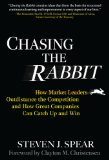Steven Spear has been on the cutting edge of research about what makes exceptional organizations exceptional for over 10 years. The landmark paper “Decoding the DNA of the Toyota Production System” summarized his PhD research on Toyota. His dissertation is the 5th most popular publication on ProQuest, the online source for academic work.
His recent book, “Chasing the Rabbit” brings his work from academic publications such as “The Harvard Business Review” into the mainstream business press.
One of the differences between Steven Spear and most other experts on the TPS is that Spear is, first and foremost, a student of theory. He does not make casual observation and render an opinion. Rather, he develops a formal theory then seeks to continuously test it against facts.
During his years of research into high-performing organizations, Spear has found consistent examples where – all conditions being equal; where products are a commodity; where the playing field is level – one organization in the field consistently outperforms the others over time. Spear builds on a metaphor of the front-runner in the Boston Marathon seemingly coasting to victory while the pack following him struggles, fights and elbows for the honor of coming in second. He calls these high-performing or high-velocity organizations the “rabbits.”
Spear’s theory of what differentiates the “rabbit” organizations is, ironically, that they consistently apply theory and theory testing into their management systems. I suppose it took someone who was well trained in the “theory of theory” to really see that. He has extended the application into a general set of principles that he has found across all organizations which excel. Further, he has found that mediocre operations which begin to apply the principles can rapidly and dramatically improve their performance.
He makes his case through example after example of organizations outperforming their peers and comps.
I am not going to repeat those stories here – you can click on the link above, buy the book, and read them for yourself. Rather, over a series of posts, I am going to go through some of the points in the book that struck me, share my mental notes, cite examples where I believe his theory holds, and hopefully spark some discussion.

These days there is a turbulence and uncertainty throughout the global economic system. The cascading effect of slow down is affecting all organizations. The difficulties create opportunities to implement needed changes. This book is helpful and gives lot of insight -what can organizations do to hold declining volumes?
khaja ansari
lean consultant
949-748-9584